Nobel Foundation Cancels Russia, Belarus, Iran Invites To Prize Awards
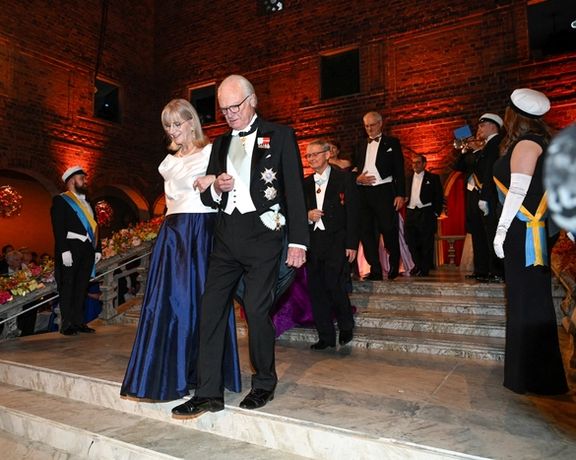
The Nobel Foundation said on Saturday it would not after all invite the ambassadors of Russia, Belarus and Iran to attend the Nobel Prize awards ceremony in Stockholm this year.

The Nobel Foundation said on Saturday it would not after all invite the ambassadors of Russia, Belarus and Iran to attend the Nobel Prize awards ceremony in Stockholm this year.
The announcement reversed an earlier decision to invite the three countries will be invited after widespread criticism.
Last year, the foundation left out the ambassadors of Russia and its ally Belarus because of Moscow's invasion of Ukraine, as well as Iran for its human rights violations. Iran also assists Russia in its invasion of Ukraine by supplying hundreds of kamikaze drones.
The foundation said on Thursday it would invite them, and Iran's ambassador, to this year's prize award ceremonies in December, commenting that it sought to include even those who did not share the values of the Nobel Prize.
That announcement prompted the leaders of several Swedish political parties to say they would boycott the ceremonies.
"We recognize the strong reactions in Sweden," the foundation said in a statement on Saturday.
"We, therefore, choose to repeat last year's exception to regular practice – that is, to not invite the ambassadors of Russia, Belarus and Iran to the Nobel Prize award ceremony in Stockholm."
The prize-winners are announced in early October and five of the six Nobel prizes are awarded in Stockholm every year after a nomination process that is kept secret for the next 50 years. The Nobel Peace Prize is awarded in Oslo where separate festivities are held.
Reporting by Reuters

Early on Saturday, a road accident in Iraq claimed the lives of at least 16 individuals, 12 of whom were Iranians, as reported by the Iraqi state news agency.
Additionally, the accident left thirteen people injured, and it took place on a road connecting two cities in Iraq's northern Salahuddin province. A local medical official confirmed that the injured were transported to hospitals in critical condition.
Millions of Iraqi Shias and pilgrims from various countries, including Iran, Azerbaijan, Pakistan, Lebanon, Afghanistan, Bahrain, Kuwait, and Saudi Arabia, have already arrived or are en route to the holy Shiite city of Karbala, situated approximately 100 kilometers (62 miles) southwest of Baghdad. They are are participating in the Arbaeen ceremonies, scheduled for September 6 this year.
Arbaeen, which translates to "fortieth," is a significant Shiite religious observance observed forty days after the Day of Ashura. It commemorates the death of Hussain ibn Ali, the grandson of Prophet Muhammad, who was killed in a power rivalry in 680 AD.
The Islamic Republic government perceives this event as an opportunity to exert influence in the region and encourages Iranian to visit Iraq with various incentives. These include providing free medical services and rest stops along the pilgrimage route, offering free internet during the journey and within Iraq, providing interest-free loans, granting 200,000 Iraqi dinars ($150) to pilgrims, and issuing special passports with reduced bureaucratic requirements. The allocation of affordable foreign currency, previously in the form of dollars or euros until this year, is funded from Iran's frozen assets in Iraq, set to be released as part of a prisoner exchange agreement with the United States.
Despite these incentives, the number of Iranians willing to undertake the Arbaeen Shiite pilgrimage is on the decline.
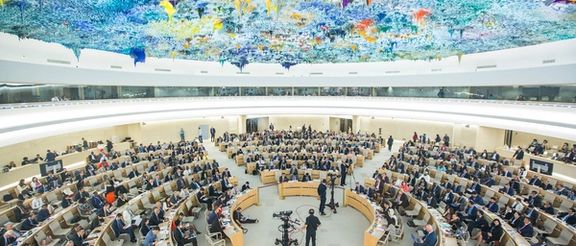
UN rights experts have expressed grave concern over Iran’s new draft hijab bill, with the first anniversary of Woman, Life, Freedom protests only two weeks away.
The legislation, crafted by a dozen hardline lawmakers after the full parliament declined to deliberate on it and assigned the responsibility to a smaller group, encompasses various penalties for women who appear in public without proper attire and complete headscarves.
Following the death of Mahsa Amini in police custody in September 2022, which led to nationwide anti-regime protests, the Iranian government temporarily relaxed its strict enforcement of hijab rules, with more women appearing in public wearing ordinary attire. However, since March, hardliners have intensified their rhetoric and actions to suppress women's defiance of hijab and regain lost ground. They have issued various instructions to government entities in this regard. The current hijab bill represents the culmination of their efforts to reestablish what they describe as "law and order."
“The draft law could be described as a form of gender apartheid, as authorities appear to be governing through systemic discrimination with the intention of suppressing women and girls into total submission,” the UN experts said on Friday. They emphasized that the proposed “Bill to Support the Family by Promoting the Culture of Chastity and Hijab” and existing restrictions are “inherently discriminatory” and may amount to gender persecution.

Iranian rights activists, some media outlets, former government officials and many commentators in Iran have been voicing their opposition to the new hijab law, which has not yet been officially promulgated.
In July, Sara Bagheri, a prominent attorney told local media that the bill violates individuals’ rights, including their right to security and will pose a threat to the reputation and dignity of thousands of women who want to choose their own style of clothing. She also questioned the heavy fines stipulated in the law and asked what would happen if a woman is unable or unwilling to pay.
The UN experts also stated, “The punishments include deprivation of a range of basic freedoms and social and economic rights, which will disproportionately affect economically marginalised women.”
Shima Ghousheh, a law expert, wrote in a commentary published by the reformist Etemad newspaper in July, "The country’s whole budget should be used to build prisons for women because many Iranians will not be able to pay these [heavy] fines and should be sent to prison." She pointed out that the punishments for unveiling or "improper" hijab are much heavier than those prescribed by law for financial crimes, including embezzlement and drug-related offenses.
The UN experts who issued the statement against the hijab law include Javaid Rehman, Special Rapporteur on the situation of human rights in Iran, several other UN special rapporteurs, and members of Working group on discrimination against women and girls.
“The weaponisation of “public morals” to deny women and girls their freedom of expression is deeply disempowering and will entrench and expand gender discrimination and marginalisation, with wider negative consequences for children and society as a whole,” the experts said.
“We urge authorities to reconsider the compulsory hijab legislation in compliance with international human rights law, and to ensure the full enjoyment of human rights for all women and girls in Iran,” the experts told the Islamic Republic of Iran.
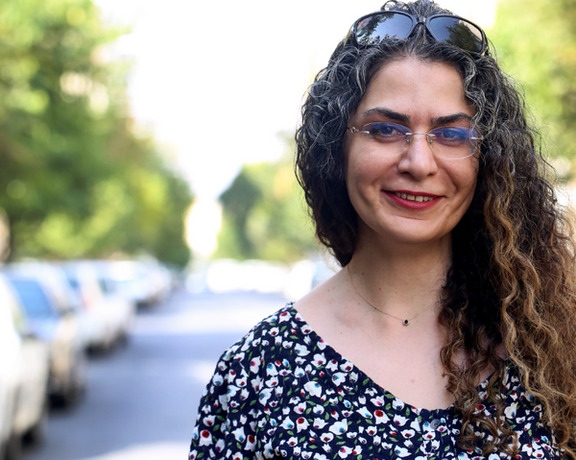
Bahareh Hedayat, an Iranian political prisoner in Evin Prison, has gone on hunger strike to protest repression and the death of another prisoner Javad Rouhi.
Javad Rouhi, a young Iranian protester who was one of the icons of the Women, Life, Freedom movement died in prison on Thursday.
Hedayat’s act coincides with the approaching anniversary of the Iranian uprising in September 2022 after Mahsa Amini died in hijab police custody.
In a poignant letter received by Iran International, Hedayat laments the Iranian government's efforts to normalize the loss of countless young lives.
In her statement, Hedayat articulates her motives: "I, in obedience to my conscience and in its defense, protest against the tragic death of Javad Rouhi in prison and express my support for the year-long, unyielding resistance of women in my country for freedom. I hereby declare my hunger strike, commencing from Friday evening. May this humble contribution serve the cause of freedom for Iran, a nation weary of tyranny."
Furthermore, Hedayat underscores the government's attempts to manipulate and distort the collective conscience, employing tactics that include the spilling the blood of the youth, suppression of university students, dismantling of academic institutions, and subjecting grieving families to relentless persecution.
Hedayat further condemns the accusations of collaboration with foreign governments against Niloufar Hamedi and Elaheh Mohammadi, two imprisoned journalists who first reported Mahsa Amini's death.
Hedayat, a dedicated activist, played a crucial role in the One Million Signatures campaign aimed at reforming discriminatory laws against women in Iran. Throughout her activism, she faced multiple arrests and periods of imprisonment.

A political figure with close ties to Iran's former President Mahmoud Ahmadinejad says he was the target of several assassination plots during the past two months.
Ahmad Alirezabeigi, a lawmaker from Tabriz, disclosed to the Didban Iran [Iran Monitor] website in Tehran that members of Ahmadinejad's office have consistently remained vigilant regarding potential attacks on the former President. However, the frequency of such threats has notably increased over the past two months.
On 27 August, Dolat-e Bahar, a Telegram channel close to Ahmadinejad reported that "Based on information from reliable sources, Mr. Ahmadinejad's office dispatched a letter to high-ranking military, police, and security commanders and officials, cautioning them about highly concerning developments and activities targeting him."
The report also stated that "Ahmadinejad has requested enhanced security measures for his protection and urged authorities to confront those responsible." Additionally, it highlights that "recent practical activities strongly suggest the existence of an organized plot to assassinate Dr. Ahmadinejad."
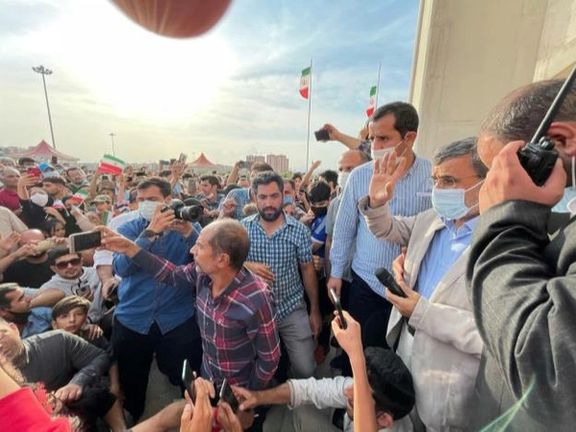
While Iranian media typically extensively cover any developments related to Ahmadinejad, it is noteworthy that they have seemingly overlooked this particular story. However, it remains uncertain whether the choice to disregard news regarding the attempted assassination of Ahmadinejad stemmed from higher levels within the Iranian political hierarchy.
Alirezabeigi told Didban Iran that the former President's office has presented evidence about the attempt on his life to the authorities.
It's likely that Ahmadinejad's office decided to publicize information about the alleged plots when they perceived a reluctance on the part of authorities to pursue the case further.
Alirezabeigi told Didban Iran that concerns about Ahmadinejad's safety have always been a priority for his office and its staff members, but recently they saw evidence that they thought should be communicated to the authorities.

Ahmadinejad has been consistently outspoken in his criticism of the Iranian government, particularly since the end of his presidential term. This criticism intensified notably from 2017 onward, coinciding with the onset of popular anti-government protests. While he frequently targeted the presidential administration and the Judiciary, especially when led by one of his arch-enemies, Sadeq Amoli Larijani, accusing them of corruption and inefficiency, he generally refrained from direct attacks on Supreme Leader Ali Khamenei.
Nonetheless, since 2019, Ahmadinejad also targeted Khamenei and his financial conglomerate. Since 2021, when likeminded Ebrahim Raisi took office as Iran's President, Ahmadinejad has been silent. His silence was so significant that Iranian media often wondered where he was during this period.
In one of the most recent reports of this kind, Khabar Online website said that Ahmadinejad has been recently holding meetings with his former aides Esfandiar Rahim Mashai and Hamid Baqaei.
Abbas Amirirfar, another aide of the former President said that Ahmadinejad and his aides have concluded that both the leading political factions -reformists and conservatives - have failed to solve Iran's problems and the nation expects Ahmadinejad to do something, Khabar Online said in its report.
There is a prevailing belief that the former president retains political support from numerous disadvantaged Iranians who appreciate his populist approach. They particularly value his track record of providing cash handouts and subsidies during his presidency.
As of now, the Iranian judiciary, police, and security agencies have not issued any response to this news. Nevertheless, Alirezabeigi suggests that officials should delve into specific details to gain further insights into the alleged plot. However, he did not provide any elaboration on the nature of these details.
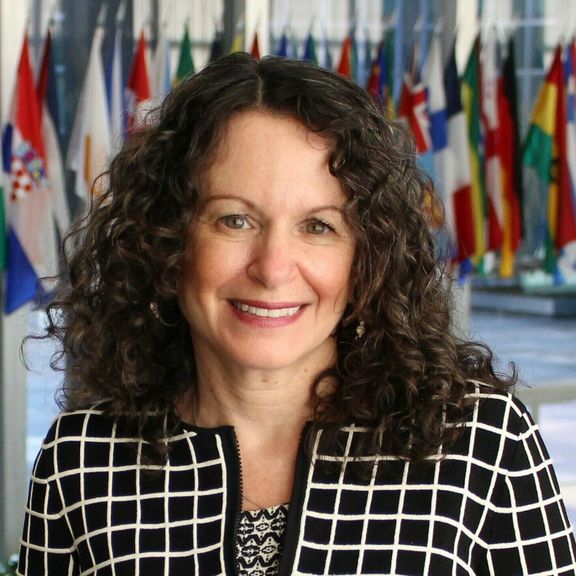
US Ambassador to the UN's Human Rights Council has condemned Iranian officials in UN leadership roles on the anniversary of Mahsa Amini's death.
Michèle Taylor's comments come as the Islamic Republic of Iran prepares to chair the UN Human Rights Council Social Forum in November.
Taylor stated, "As we approach the one-year anniversary of Mahsa Amini's tragic death, let me be clear: The US reasserts that Iran, with its appalling human rights record, has no place in leadership roles in the UN human rights ecosystem. The time for accountability is now."
Mahsa Amini, a 22-year-old Iranian woman received fatal wounds after the hijab police arrested her in Tehran and died three days later in the hospital. Her death led to months of antiregime protests during which security forces killed more than 500 civilians and arrested around 22,000.
The controversy surrounding Iran's involvement in UN leadership positions has been a contentious issue. In June, the Islamic Republic secured a leadership role as one of the vice-presidents of the UN General Assembly, drawing reactions from several member states and numerous activists.
In May, Iran's UN ambassador, Ali Bahraini, was appointed to chair the UN Human Rights Council 2023 Social Forum, leading to widespread anger and indignation. The forum is scheduled to take place in Geneva on November 2 and 3.
In response to these appointments, UN Watch, an independent human rights organization, launched a petition to UN Secretary-General Antonio Guterres, urging him to cancel the appointments. Additionally, UN Watch submitted a resolution to the UN to overturn the decision, gaining further attention and scrutiny regarding Iran's involvement in UN leadership positions.






